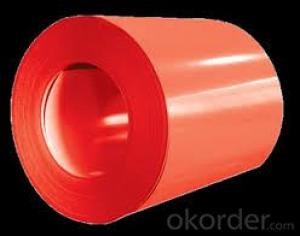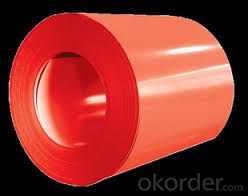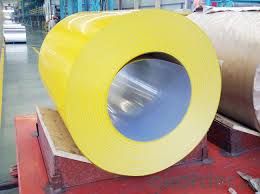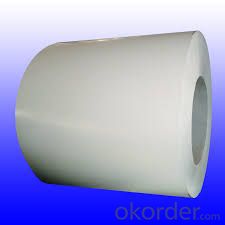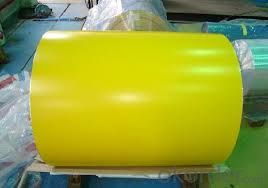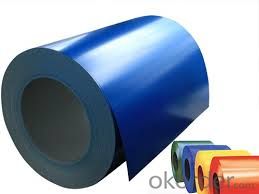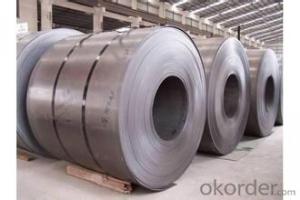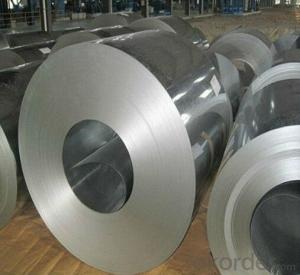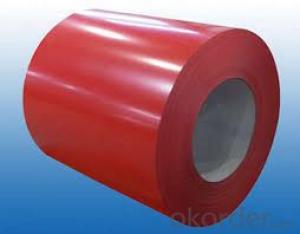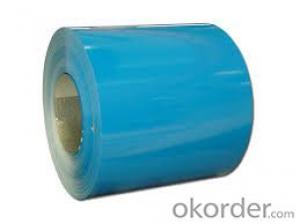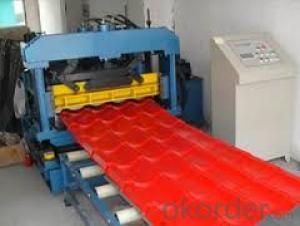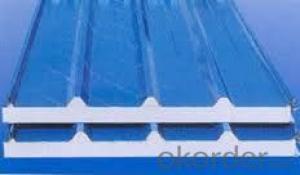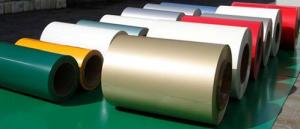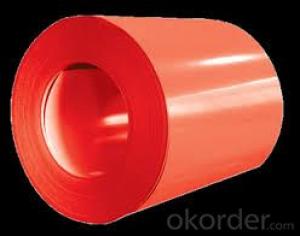Prepainted Galvanized Rolled Steel Coil/Sheet-CS
- Loading Port:
- Tianjin
- Payment Terms:
- TT OR LC
- Min Order Qty:
- 30 m.t.
- Supply Capability:
- 500000 m.t./month
OKorder Service Pledge
OKorder Financial Service
You Might Also Like
Description:
Prepainted Galvanized Steel usually refers to have substrateprocessed with surface processed and coated then(roller coated )or bonded organic thin film and baked, and it is able to be processed tofinal prodevtion .
PrepaintedGalvanized Steel qualified with excellent decorative ,formability ,corrosionresistance ,coating adhesion ,can keep for a long time as well as maintainfresh color .For color coated steel sheet can obtain good economicbenefit by steel belt wood ,efficient in construction and save energy ,preventpollution etc.Which is an ideal material;for manufacturing board.
Specifications:
| Thickness Width | 0.20-1.2mm (BMT) 600-1250mm |
|---|---|
| Zinc Coating | 100-275g/m2 |
| Color | According to RAL color fan or as per request |
| Internal Diameter | 508mm or 610mm |
| Coil Weight | 3-6MT |
| Quality | Commercial and structural quality |
| Paint | Polyester paint for topside, epoxy for reverse |
| Standard | JIS G 3312, ASTM A755M, EN 10169 |
| Base Steel Grade | SGCC,SGCD,DX51D+Z,DX52D+Z;S200GD,S220GD,S280GD,S350GD,CS,FS,SS |
Technical Data:
Yield Strength | (Mpa) 280-320 |
Tensile Strength | (Mpa) 340-390 |
Elongation | 20%-30% |
Reverse Impact | 9J |
T-bending | ≥2T |
Pencil Hardness | ≥2H |
Duration Of Salt Spray Test | 500 H |
Bending At 180 Degree | No crack, purling and fraction |
Applications:
It can be widely used in transportation, light industry, civil usage and farming. It is also the perfect building material in construction for making steel roofing,insulation panel, corrugate sheet, facade wall,shutters,T-bar and home appliance.
Images:
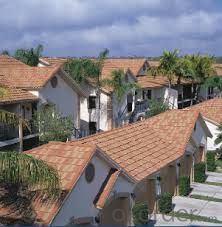
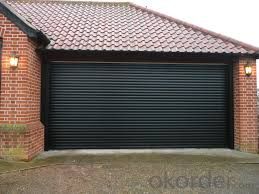
Packaging & Delivery:
The packing of coils consists of anti-damp paper, PVC film, hardboard paper, steel box, strapped with steel strips, fitted with locks and edge protectors and guarantees the optimal condition of the delivered goods. Each coil can be additionally fitted with wooden/steel skids(eye to the side) or wooden pallets(eye to the sky).
- Q: How are steel coils used in the production of construction machinery?
- Steel coils are used in the production of construction machinery as they are a primary raw material for manufacturing various components such as structural frames, chassis, and other heavy-duty parts. These coils are typically processed and fabricated through cutting, bending, welding, and shaping techniques to create the required components that form the foundation of construction machinery.
- Q: Recently I bought Bleach's Grimmjow's replica sword from swordsswords and I was wondering how strong is 440 steel when used for a 21 inch blade? Can it cut effectively? Is it dangerous?
- That is intended for display only. In other words it is useless for any other purpose. Stainless steel is only good for short knives. As it does not hold an edge and is not very strong.
- Q: What is the difference between carbon steel and spring steel?? And which is the better one to make swords with??
- High Carbon Spring Steel
- Q: What kind of steel should be used for constructing a steel building?
- Quality okorder /
- Q: i am looking for an exact process of how to forge damascus steel.any tips or pointers and web sites or tutoreals will be helpfull.
- hand made folding knife English tip, blade of Damascus metallic sort Rose, 2,5mm thickness, no liners, teja spring embellished by using metallic report and billet surrounded of chrome metallic. A Damascus blade knife is characterised by using a wavy, mottled visual allure on the blade that’s led to by using the approach used to shape the metallic. the technique of transforming into Damascus metallic is derived from a centuries-previous forging technique used to create blades that grew to become very just about mythical of their attractiveness for power and sharpness it exchange into reported a Damascus knife ought to shrink with the aid of a rifle barrel to boot as with the aid of a hair falling on the blade.
- Q: Theirs this two handed chinese sword on amazon with a forged combat steel blade and i was wandering if it means combat steel in the same sense that tempered carbon steel can be used?
- Great answer by JayDub. Amazon isn't exactly a great site for legitimate sword shopping. Look for legitimate retailers specializing in handmade swords.
- Q: How are steel coils used in the production of electrical enclosures?
- Steel coils are used in the production of electrical enclosures as they are formed and shaped into various components such as panels, frames, and doors. These coils are typically cut, stamped, and bent to the required dimensions, providing the necessary strength and durability for the enclosures. Additionally, steel coils can be coated or painted to enhance their resistance to corrosion and improve the overall aesthetics of the electrical enclosure.
- Q: So we all know a 1000lb steel ball will sink in water, but if you were to leave the center of the ball hollow and fill with air, if the steel ball was big enough in diameter it should float correct? What size would the steel ball need to be to float?
- sure, if the volume of air is about 7 times the volume of steel, the specific weight of the steel/air system would be below 1.0 and it will float. How do you think ships float?
- Q: How are steel coils coated to prevent rust and corrosion?
- Steel coils are coated to prevent rust and corrosion through a process called galvanization. This involves immersing the coils in a bath of molten zinc, which forms a protective layer on the steel surface. This zinc coating acts as a barrier, preventing oxygen and moisture from coming into contact with the steel, thus reducing the risk of rust and corrosion.
- Q: which cost more: ALLOY, GUNMENTAL OR STAINLESS STEEL. GIVE ME AN IDEA OF THE COST OF EACH.
- Alloy okorder /
Send your message to us
Prepainted Galvanized Rolled Steel Coil/Sheet-CS
- Loading Port:
- Tianjin
- Payment Terms:
- TT OR LC
- Min Order Qty:
- 30 m.t.
- Supply Capability:
- 500000 m.t./month
OKorder Service Pledge
OKorder Financial Service
Similar products
Hot products
Hot Searches
Related keywords
